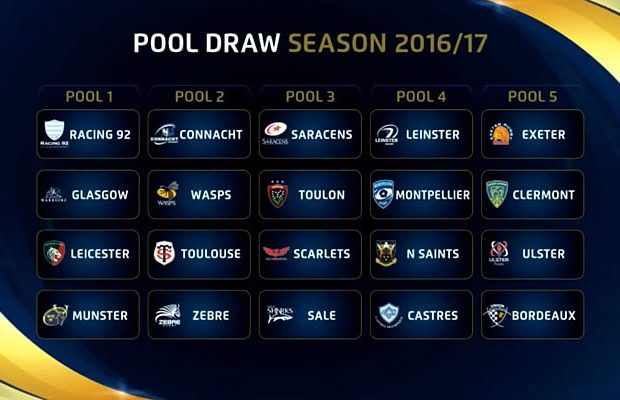Though many competitions exist for rugby union clubs around the world, few compare in terms of popularity and scale to the two organized by European Professional Club Rugby (EPCR), namely the European Rugby Champions Cup and the European Rugby Challenge Cup. As the top-flight tournament and the second-tier competition for clubs within Europe respectively, the two have rules in place that govern how they operate including but not limited to which teams qualify to take part, the various ways in which they can qualify for the competitions, and the various stages of the competitions which ultimately decide which clubs emerge victorious. Though its rules are not shrouded in mystery, many rugby fans often wonder exactly how the rugby union Challenge Cup works.
How does the rugby union Challenge Cup work? The rugby union Challenge Cup works very much like most progressive tournaments albeit with a few differences. Teams from the three main club competitions in Europe (the BKT United Rugby Championship, Gallagher Premiership, and the TOP 14) as well as one South African club with close ties to the United Rugby Championship are divided into tiers depending on the position they finish in their respective leagues. The clubs are then drawn into two pools (A and B).

Clubs first play against other clubs in their own pool then the six top from each group along with the 9th and 10th placed clubs from the Heineken Champions Cup move on to the round of 16. The top eight clubs from the Round of 16 then progress to the quarter-finals, where the top four clubs proceed to the semi-finals. The two clubs who win their respective semi-finals ultimately compete in the finals to decide that season’s winner who receives the prestigious EPCR Challenge Cup trophy.
How the Rugby Union Challenge Cup Was Formed
The rugby union Challenge Cup was conceptualized following the formation of the Heineken Cup competition in 1995 as its second tier. It started out as the European Conference in 1996 and involved 24 teams from six countries – England, Scotland, Wales, Italy, France, and Romania.
By the following year, the competition had expanded to 32 teams with clubs from Portugal and Spain joining from its 1998-99 season. The competition also changed its name to the European Shield – a name which stuck until 2001 when it was renamed the Parker Pen Shield due to sponsorship reasons.
Changes in the League Format
In 2002, the former progressive league format that first involved the dividing of clubs into groups was abandoned in favor of a more competitive knock-out format. The number of participating nations also increased to eight.
The new changes also saw the introduction of the Parker Pen Challenge Cup, whose winners automatically qualified for the next edition of the Heineken Cup. The Parker Pen Shield moniker was intern allocated to another knockout tournament for clubs that did not qualify for the second round of the Challenge Cup.
Policy changes by the Welsh Rugby Union temporarily limited the appearance of Welsh clubs from the 2003-04 season of the Challenge Cup. Further restructuring of the Challenge Cup to include both a league and knockout format brought about the end of the Parker Pen Shield in 2005 but improved the competition albeit without teams from Spain and Portugal.
Further differences in the format were introduced ahead of the Challenge Cup’s 2009-10 season with strictly five pool winners being joined by three clubs (the best third-placed to fifth-placed teams) from the Heineken Cup.
The 2010 changes also allocated Challenge Cup winners a spot in the following season’s Heineken Cup unless a case where clubs from either England or France win both the Challenge Cup or the Heineken Cup. This is because both countries are only allowed a maximum of seven teams and the Challenge Cup winner allocation is meant to be separate from a country’s initial allocation.
In April 2014, the last batch of major changes was introduced with the Challenge Cup being reconstituted under European Professional Club Rugby (EPCR). The new competition featured clubs from six rugby unions and three regional club tournaments from France (Ligue Nationale de Rugby), England (Premiership Rugby), and Wales (Regional Rugby Wales).
How Many Teams Are in the Challenge Cup?
Presently, 18 teams compete in the Challenge Cup – 17 from the three main leagues in Europe (Premiership Rugby, United Rugby Championship, and Top 14) along with one club from South Africa which is invited due to its close ties with the United Rugby Championship.
In the years since its initial inception in 1996, the number of teams has fluctuated due to various factors. After starting with 24 teams, another 8 joined the next year. The competition however reduced to 21 clubs ahead of its 1998-99 season after clubs from England and Scotland withdrew from the competition.
The clubs from the two countries rejoined the competition in the following campaign pushing the number to 28. In 2001, the Challenge Cup grew to 32 teams from eight countries before reducing to 20 teams in 2005 and remained so until its 2019-20 season.
The 2020-21 season of the Challenge Cup saw 22 teams battle it out for the competition’s top honors. The number however reduced to 15 teams in their 2021-22 edition though another six teams joined that season’s tournament from the Champions Cup.
English and French Dominance
Though the rugby union Challenge Cup has been contested by clubs from as many as eight countries, only teams from two – England and France have dominated the competition since its formation.
French clubs won the first four editions before popular Premiership rugby Harlequins ushered in an era of English superiority in the early 2000s which lasted until a French club (Clermont) recaptured the Challenge Cup trophy in 2007.
An English team (Bath) nevertheless continued the trend the following year until Cardiff Blues became the first Welsh team to win the competition in its 2009-10 season. The next two campaigns saw teams from England and France split top honors before Irish side Leinster spoilt the part in 2013.
Since then, the Challenge Cup has been won by either a French or an English club with the exception of its 2017-18 season which saw Welsh aces Cardiff Blues clinch their second title. Bookmaker predictions suggest that the trend appears set to continue for the foreseeable future.
